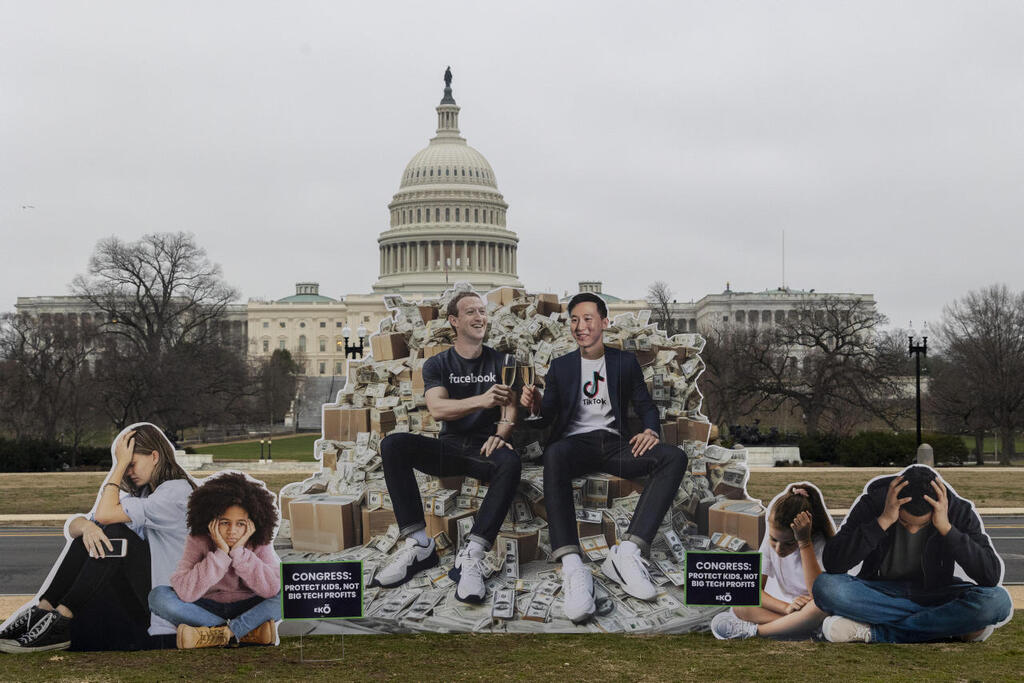
Analysis
Is TikTok about to be banned in the US?
A new bill, which gained momentum following the Hamas attack and the spread of hatred, threatens to block the Chinese platform in the US if it is not sold to American hands. Potential investors include: former CEO of Activision, who is interested in recruiting Sam Altman, CEO of OpenAI
After years of mostly talking about it and political conflicts, the initiative to block TikTok in the United States is gaining significant momentum and a new bill on the subject is expected to be voted on in the House of Representatives on Wednesday. The rapid progress of the move, which seemed to be stuck in the mud for so long, caught TikTok by surprise. At the same time, various parties are trying to leverage the threat in order to acquire the popular social network, which is currently owned by the Chinese internet technology company ByteDance.
The efforts of the administration and the political system began in 2020 with an attempt by then-President Donald Trump to block the application's activity through a presidential order. This, against the background of reasonable concerns, that the Chinese control of the company gives Beijing access to the information that TikTok collects on American citizens, and is also used as a tool to spread propaganda and fake news. A year ago, a bill was introduced in the Senate to ban TikTok in the United States, but legislative momentum waned by the end of the year, and in December the Senate announced that the legislation would not be advanced before 2024.
Biden will sign the bill
However, last week these efforts were revived: the Energy & Commerce Committee of the House of Representatives approved a bill to block TikTok with a majority of 50 supporters and zero opponents. The approval was the result of months of work behind the scenes, led by legislators who are considered pragmatic and thanks to the close support of the Deputy Attorney General, Attorney Lisa Monaco, who helped draft the bill and mobilize the support of the elected Democrats on the committee. Another variable that revived the legislative initiative is the consequences of the Hamas attack on October 7. In the days and weeks following the attack, many critics noted an increase in anti-Semitism, hateful content, and anti-Israel fake news on TikTok (as well as other social media platforms). Of particular note was the viral trend in which many TikTok influencers spoke enthusiastically about Osama bin Laden's anti-Semitic and anti-American propaganda writings.
The House of Representatives is expected to approve the bill on Wednesday, which will then go to the Senate for approval and to President Joe Biden for his signature. The White House has already announced that the president will sign the bill if it reaches his desk.
If the bill is approved, ByteDance will be required to sell its holdings in TikTok within five months, after which the platform's activity will be banned in app stores in the United States and in web hosting services in the country. According to The Wall Street Journal, the approval of the bill in the committee surprised TikTok, which did not expect the legislative efforts to gain such rapid momentum. TikTok is working to block the legislation. Its first target is the Senate, as several senators have already announced that they will oppose it for reasons of harming freedom of expression and a desire to avoid government interference in business activity.
These efforts could gain support from a surprising party: Trump, who has found a greater threat. “If you get rid of TikTok, Facebook and Zuckerschmuck will double their business,” Trump wrote on Truth Social. “I don’t want Facebook, who cheated in the last Election, doing better. They are a true Enemy of the People!”
Trump has not called on elected Republicans to oppose the legislation, but if he does, it could lead to its immediate halting.
If these efforts fail and Biden signs the bill, TikTok will petition against the legislation on the grounds that it violates the First Amendment to the Constitution. A federal court has already shown a willingness to respond to such claims, having blocked the implementation of similar legislation in Montana in November.
The company will appeal to the High Court
In the meantime, the legislative moves are generating interest from various parties in acquiring control of TikTok. A source close to the issue told the Wall Street Journal that Activision's former CEO, Bobby Kotick, told ByteDance founder Zhang Yiming that he was interested in purchasing the platform. Such a deal would be worth hundreds of billions of dollars, and Kotick is looking for possible partners and investors, among others, he approached OpenAI CEO Sam Altman. The company can use the platform to train its artificial intelligence models, but it is not clear at this stage what it can bring to the table in order to advance the deal, since it does not have the necessary capital to carry it out, and Kotick is looking for other investors for this purpose.
Even if the legislative process is completed, there is little chance that TikTok will be blocked or sold before the United States presidential election in November. The company will appeal to the court against any decision that would oblige it to sell or block its operations, and in light of the precedents, it is likely that the court will grant the request to suspend the implementation of the legislation until a final decision is made - a process that could last months, maybe even years. In the upcoming elections TikTok will probably be available in the United States, and under Chinese ownership. Those who fear the disruptive effect of the platform should find other ways to deal with it.














